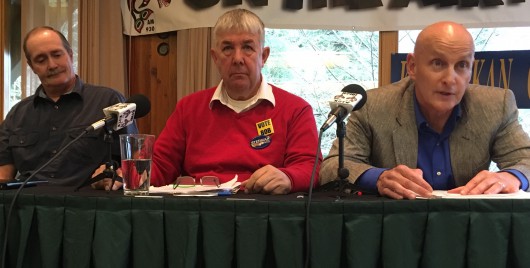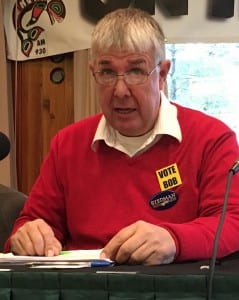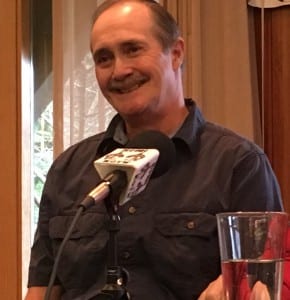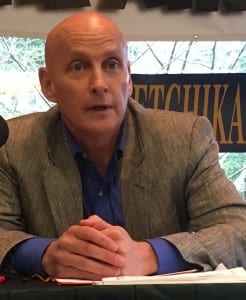
From left, House District 36 candidates Ken Shaw, Bob Sivertsen and Dan Ortiz answer questions during a Ketchikan Chamber of Commerce lunchtime forum. (Photo by Leila Kheiry)
Three candidates running for House District 36 had a busy day on Wednesday.
Incumbent Dan Ortiz, Republican challenger Bob Sivertsen and Constitution Party challenger Kenneth Shaw answered questions for about an hour during a Ketchikan Chamber of Commerce lunchtime forum, co-hosted by KTKN radio; and then participated in another one-hour evening forum on KRBD community radio.
On Nov. 8th, House District 36 voters will have to decide which of the three Ketchikan candidates they think will best represent their interests in the Alaska Legislature.
Will it be the incumbent, a non-affiliated candidate who caucused with the Democrats during the last session? Ortiz argues that his non-majority status in the last session helped him leverage his vote to replace funding for services important to the region, but he also predicts that, if re-elected, he’d be able to join a new bipartisan majority.

Republican candidate Bob Sivertsen is a retired City of Ketchikan employee and current City Council member. (Photo By Leila Kheiry)
But, Sivertsen said Republicans have held the majority for a long time, and he doesn’t see that changing with this election. He argues that as part of that majority, he’d be able to better influence how the budget is written in the first place. Therefore, the “vote leveraging” power wouldn’t even be needed.
And Shaw said the two-party-based political system is broken, and the district needs someone who is willing to scale back the size of government to fit Alaska’s current revenue.
There’s been a big focus on the state budget, with lots of news coverage of that big, looming issue facing Alaska right now. But, some different topics came up during the recent forums.
One was the issue of privacy, and a new state database of people who have been prescribed certain kinds of medication. It’s meant to help address the state’s opioid epidemic.
Shaw said the drug database is part of a larger problem with government intrusion.

Constitution Party candidate Kenneth Shaw is a caretaker at Orton Ranch and homeschools his children. (Photo by Leila Kheiry)
“It’s a thorn in the side for me,” he said. “The government has too many things going on that interferes with our privacy now. I’m not willing to let it go on if I can do something about it.”
Sivertsen agreed. He said that it’s a well-meant idea, but it could negatively affect a person later in life.
“You could have taken a medication at one time for one event and later on you could, say, apply for a gun permit. They could look back at your medical record and say, ‘Hey, this guy took something then that said he might be this way now,’” he said.
The database is intended for use by medical professionals and pharmacists only, as a way to reduce instances of addicts going to multiple doctors for extra prescriptions.
Ortiz said he voted in favor of establishing the database, after talking with a local pharmacist and others in the industry.
“There was support for that database to move forward by those folks. I’ve known Barry my whole life. I trust Barry Christensen. I believe he’d be acting in the best interest of his customers and for the people that he serves, so I was in support of that,” he said.

Incumbent Rep. Dan Ortiz is a retired high school history teacher. He also coached the debate team for many years. (Photo by Leila Kheiry)
The Second Amendment also came up during the Chamber forum. The question focused on a recent “D” grade that Ortiz received from the NRA. He said he stands by his stance that firearms shouldn’t be allowed on University of Alaska campuses, that people should have to fill out paperwork before buying guns at trade shows, and that there should be a ban on privately owned fully automatic assault rifles.
Shaw and Sivertsen disagreed with Ortiz.
On unions, Sivertsen and Ortiz agree collective bargaining is useful, and that the government can work with unions to come up with fair labor deals. Shaw said unions were useful 60 years ago, but he doesn’t think they’re needed as much now.
During the evening forum, the three candidates addressed the topic of campaign finances. This election, especially, has seen an influx of special-interest money from Anchorage and even Washington, D.C., seeking to influence the results.
Sivertsen noted that an independent PAC has been supporting him, but it’s completely separate from his campaign. He also noted that Ortiz has accepted campaign donations from some PACs. Sivertsen said that’s just politics.
“When you start running for an office, there are definitely PAC organizations that are Democrat, independent or Republican-minded,” he said. “And they’re going to donate money to candidates that they think have a chance to win.”
Sivertsen added that he doesn’t approve of the negative campaign mailers that a PAC supporting him has sent to House District 36 constituents.
Shaw said he’s amazed at the amount of outside money that has poured into the district’s election, although it’s all been to the other two candidates.
“As long as they’re fair, I’m good with it. People want to see their man win, that’s the way it works. You have certain groups that want to pull for their candidate, regardless of the party, they put their money where they feel it’s best spent,” he said. “That’s the way it works in politics today.”
Ortiz said that while his campaign has accepted money from around the state, there has been no negative campaigning from him or any groups that support him.
“Negative-campaign-style flyers like we’ve seen in this campaign, I don’t think Southeast Alaska has a tradition of that,” he said. “We’re community-based, small communities where we all know each other. It just seems like there’s no place for it in our communities, the communities of District 36.”
Sivertsen agrees that kind of negative campaigning doesn’t work in this area, and said the flyers probably will hurt him rather than help.
Shaw said anyone running for office has to have thick skin.
The three candidates agreed that a natural gas pipeline would diversify the state’s economy in the long term, but they also agreed that the state needs to stabilize its budget before making that kind of investment.
And, citing cost concerns, Sivertsen and Shaw say they oppose statewide Ballot Measure 1, which calls for automatically registering people to vote when they apply for their Permanent Fund Dividend.
State officials have estimated the cost of setting up the program would be just under $1 million. After that, it would cost about $300,000 a year to administer.
Ortiz said he supports the measure, because it would increase voting opportunities.
If you’d like to hear the entire one-hour KRBD candidate forum, we have a recording posted below.






